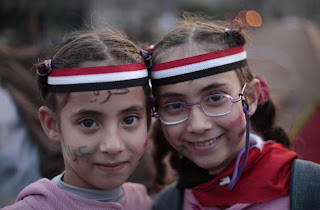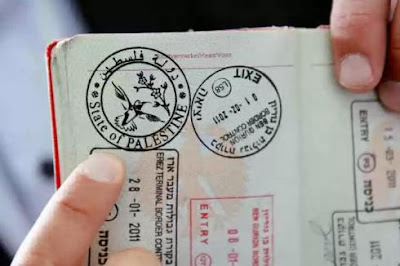My alma mater,
Smith College, is currently hosting a small group of current students in Israel for a summer of participation in one of several
Global Engagement Seminars. Students are invited to contribute to an official Smith blog as they travel, expand their horizons, complete internships, and talk with the locals.
A few weeks ago, an entry was posted titled "
Words Matter," by Katy Swartz, '13. The piece discusses the use of the word 'apartheid' in describing contemporary Israel, and the author believes that 'apartheid' is an inaccurate and damaging characterization of Israel's policies. She cites a
letter from the
Vanguard Leadership Group that states,
"The use of the word 'apartheid' by Students for Justice in Palestine (SJP) in its characterization of Israel is patently false and deeply offensive to all who feel a connection to the state of Israel. Your organization's campaign against Israel is spreading misinformation about its policies, fostering bias in the media, and jeopardizing prospects for a timely resolution of the Israeli-Palestinian conflict."
I'm going to re-state her main points, and show where Katy has gone wrong.
The main points, as I understood them, were that 'apartheid' cannot be applied to Israel because of the following reasons:
- 'Apartheid' refers to race, and "Judaism is not a race"
- 20% of Israel's citizens are Arab, and they have "full and equal rights under Israeli law"
- If Israel were racist against Arabs, it would not act justly toward its own Arab-Israeli citizens on the one hand, but unjustly toward Arabs and Palestinians elsewhere
- Self-governance, as the author defines the presence of the Palestinian Authority in the West Bank and Gaza, would not occur under apartheid
- "An apartheid regime would...[wish] to remain sovereign over the group it were oppressing because it would likely be benefiting from the forced labor of the citizens"
The author also makes the following (I think, problematic) statements:
- Palestinians were offered a two-state solution and rejected it; as such, they are implicitly to blame
- Palestinians were offered citizenship in East Jerusalem and "refuse[d] to participate in the city government"
- "Israel is still committed to the establishment of the state of Palestine in the Palestinian territories"
- Israel's recent 'control' policies are "a result of Palestinians blowing up innocent Israeli civilians (which of course did not happen in South Africa)"
- "Israel remains dedicated to finding a solution within the parameters that allow for the Jewish state to remain in existence alongside a future Palestinian state"
Well. Let's unpack some of this, shall we?
First of all, some background on the author:
Katy Swartz will be a junior at Smith next year,
self-identifies as an orthodox Jew, and is a Jewish Studies major at Smith. By no means am I claiming that Jews are innately unable to make valid contributions to this conversations (and, as
Lucas Koerner proved, Jewish ethics can be a large motivating factor to stand
with the Palestinians), but I believe that knowing an author's background is an essential part of understanding their belief system and teasing apart their biases.
She is on this summer program with other Smith students of varying opinions and identities surrounding the conflict. I'm sure the experience may at times feel threatening to her beliefs and her identity. I applaud Katy for attempting to engage in these difficult conversations, and for making public her opinions and her frustrations.
Katy was raised in a Jewish household (see above interview) and I have seen her, along with other student members of the
Smith Israel Alliance, at many related events on campus. I particularly remember her presence at a presentation by scholar and author
Norman Finkelstein on campus in Spring 2011. She and her peers put up posters from
CAMERA on the doors to the venue where Finkelstein was speaking, and handed them out to folks as they entered the building.
These
fliers are
despicable, shabby, inaccurate, discriminatory pieces of literature with a Zionist agenda and absolutely no constructive or intellectual value, in my opinion, and in the opinion of others, including Uri Strauss with the Palestine Action Coalition (see his piece on apartheid and Israel
here and note his comment on Katy's post
here).
Here's the flier (from
CAMERA)... And here's Finkelstein (from his
website)

The flier from CAMERA purposefully utilizes a photograph of a gun-toting, turban-wearing, bearded Arab man for shock value, and coercively manipulates the viewer into associating Finkelstein with the fear and hatred of 'the Arab'. It utilizes the color pink in a way that suggests that Finkelstein is effeminate or gay, and subversively uses homosexuality as a reason to discredit Finkelstein's academic and intellectual value (indeed, when typing 'Norman Finkelstein' into Google, 'Norman Finkelstein gay' pops up). More crucially, the flier contains biased sources and surface-level answers that are absolutely inappropriate and disrespectful to the event and to the speaker and the hosting organizations. I hold anyone who hands out these fliers responsible for their message.
Uri Strauss, currently the Law Fellow with
Western Mass. American Friends Service Committee, published an article in 2002 titled "Defining Apartheid: Israel's Record." Strauss points out that 'race' is widely interpreted under UN Conventions, and
would include Jews as a race. We cannot use the technicality of language to allow occupiers and human rights abusers to escape responsibility. I would suggest that perhaps
genocide is a more accurate description, as defined by the 1948 UN Convention on the Prevention and Punishment of the Crime of Genocide,
Article 2:
Whether or not Judaism is considered a race, Israel is still upholding blatantly discriminatory and abusive policies.
Katy's second point about the "full and equal rights under Israeli law" for Arab citizens of Israel is simply incorrect. The Arab citizens of Israel have been subject to consistent and repressive policies since the founding of the state of Israel, including land grabs, racist laws, home demolitions, forced migration (see
this article from Middle East Monitor). Even if Arab citizens of Israel were treated like royalty, this has no bearing whatsoever on the treatment of other Palestinians within the borders that Israel currently claims.
Her next point (that a racist regime does not pick and choose where it practices racism) is ridiculous. Any racist act by a regime means it is a racist regime, in the same way that "injustice anywhere is a threat to justice anywhere" (Dr. Martin Luther King, Jr.). Sure,
everyone's a little bit racist sometimes from a sociological perspective, but we're not all committing systemic genocide on a societal level.
Katy also states that self-governance would not occur under apartheid. Firstly, self-governance can absolutely occur under apartheid (
Bantustan, anyone?). In addition, the
Palestinian Authority has been perceived by Palestinians to be corrupt, unrepresentative, and unsupported and disrespected by the majority of the outside world. The PA may wear the mask of self-governance, but it does NOT represent
genuine self-governance.
She also makes the point that an apartheid regime would wish to remain sovereign over the oppressed group to benefit from its forced labor. Israel either DOES implicitly benefit from cheap Palestinian labor, with crowds of men sitting near roads hoping to land a
temporary menial labor job with a passing Israeli, OR the
ridiculous permit system in combination with
checkpoints prohibit Palestinians from having good jobs within Israel or within the Occupied Palestinian Territories.
For me, Katy's analysis relies on a lack of historical understanding of what power dynamics, collective memory, cultural narratives, and 'resistance' mean, and more specifically what these terms mean to Palestinians. Decades of mistreatment and
neglect from the majority of the international community have created generations of Palestinians that are struggling with notions of identity and homeland. Many Palestinians still hold the deeds to land inside Israel. Millions of Palestinians have been born outside the holy land, but still identify with the history, the myth, and the physical place of Palestine. Without a fully functioning, recognized, supported government, and subject to all forms of economic sanctions, physical and mental abuse, I wonder how Katy recommends that Palestinians reconcile their past, their present and their abusers, and their dreams for a future.
"Can the hungry go on a hunger strike? Non-violence is a piece of theatre. You need an audience. What can you do when you have no audience? People have the right to resist annihilation."
Palestinian suicide bombers are resisting occupation and humiliation. I do not condone violence against anyone or anything, but I understand why certain parties are behaving and reacting in the ways that they do; as Arundhati Roy says, they are 'resisting annihilation'.
Katy also explains that Israel is not committing the crime of apartheid, but rather utilizing 'control' strategies as a result of "Palestinians blowing up innocent Israeli civilians." The destruction of human life (or animal life, or natural forms of life, in my opinion) is never desirable. But we must call a spade a spade. Or it's not quite a spade, let's call it 'frustrating' and 'harmful' if we don't have the right words to describe it.
In the end, we can all agree that something is clearly wrong in the holy land, and we are all responsible for what has happened in the past and for what will happen in the future. We are all complicit parties to this conflict, until it is resolved. No one -- neither Israelis nor Palestinians nor aid workers nor tourists nor Druze, etc. -- feels secure, and everyone deserves that right.
I believe it is possible to achieve a satisfying, secure outcome for all parties, and that the first step is to watch our language and listen to each others' stories. But as long as the vernacular of the visionless presides, there will be neither peace nor justice in the Holy Land.
To Katy (and others reading this), this is not meant to be a personal attack, and I do apologize if it feels that way. If you're reading this, I'm interested in hearing back from you. You can post a comment or email me at smthgrlo@gmail.com, and I promise to respond respectfully and promptly.


















